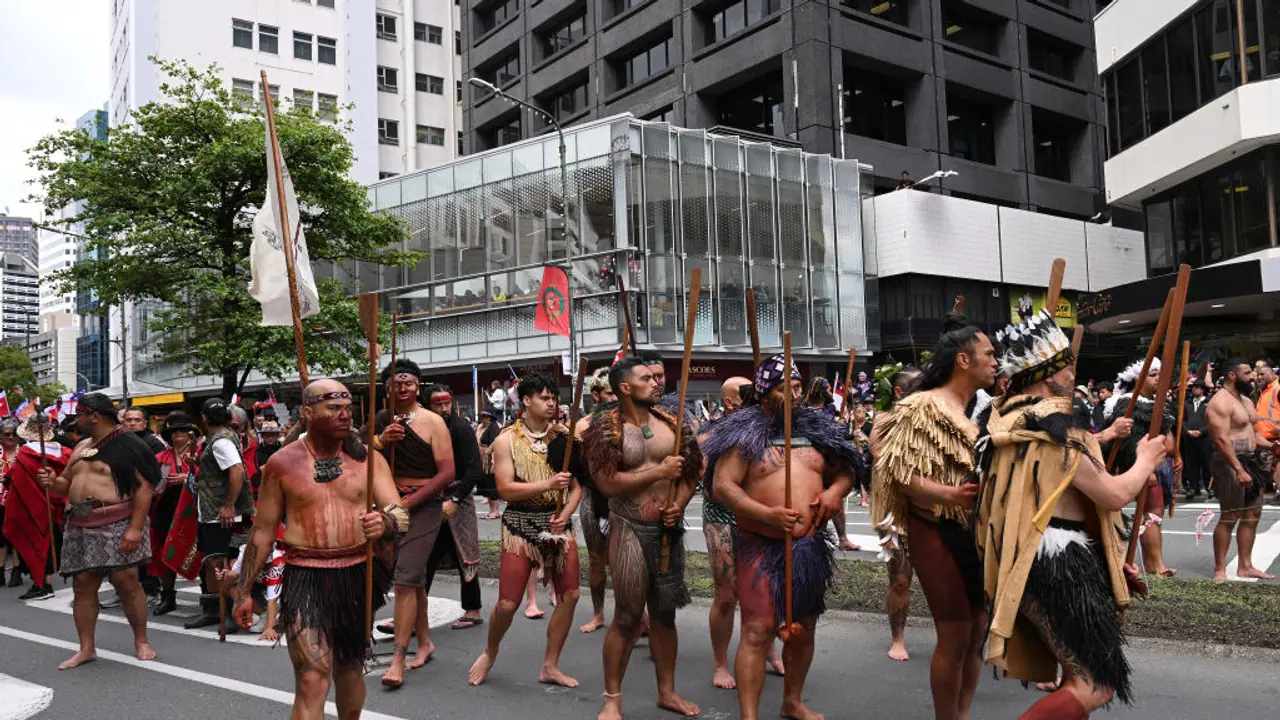Tens of thousands of New Zealanders gathered outside parliament on Tuesday in what became one of the largest protests in the country’s history.
Tens of thousands of New Zealanders gathered outside parliament on Tuesday in what became one of the largest protests in the country’s history. They rallied against a bill that critics argue would undermine the rights of Maori and potentially reverse decades of progress on race relations.

Police estimated the crowd at 42,000, as demonstrators gathered in opposition to the Treaty Principles Bill, introduced earlier this month. The bill seeks to reinterpret the 184-year-old Treaty of Waitangi, an agreement originally signed between the British Crown and the Indigenous Maori.
The libertarian ACT New Zealand party, a junior member of the ruling centre-right coalition government, is pushing for a more limited interpretation of the Treaty of Waitangi, arguing that the current interpretation discriminates against non-Indigenous citizens.
Although the bill is unlikely to pass due to insufficient support, critics view it as an attempt to undo decades of policies designed to empower the Maori population.
Maori, who represent about 20% of New Zealand's 5.3 million people, experience higher rates of deprivation, incarceration, and poorer health outcomes compared to the general population.
"I'm here for my grandchildren, my children and for their children", Hoana Hadfield from Wellington, who was marching in a protest for the first time, was quoted as saying in a Reuters report.
"I think it's important that we keep our kaupapa which is our values as Maori and our culture and its a real big thing for us to have cultural identity."
Many in the crowd were dressed in traditional Maori attire, wearing feathered headgear and cloaks, while carrying traditional weapons. Others sported t-shirts emblazoned with "Toitu te Tiriti" (Honor the Treaty), and hundreds waved the Maori national flag.
The protest followed a nine-day march, or hikoi, which started in the far north of the country. Thousands joined the marchers along the way, participating in rallies in towns and cities as they traveled south to Wellington on foot and by car.
At the rally, speakers emphasized unity and solidarity. Helmut Modlik, a leader of the Ngati Toa tribe, addressed the crowd, declaring that it was too late to divide the country.
"To those who will divide us, whanau, it is too late. We are already one people," Modlik said to cheers from those gathered on the lawns of parliament.
The Treaty, first signed in 1840 between the British Crown and over 500 Indigenous Maori chiefs, established the framework for governance between the two parties. The interpretation of its clauses continues to influence legislation and policy today, with court rulings and a separate Maori tribunal expanding Maori rights and privileges over the years. ACT's coalition partners, the National Party and New Zealand First, supported the legislation through its first reading last week, but both have stated they will not back it becoming law.
A small group of politicians, including ACT leader David Seymour, appeared on the forecourt of parliament to listen to the protesters. A petition with 203,653 signatures opposing the bill was also presented to parliament. As Seymour emerged, thousands of protesters began chanting "kill the bill," followed by a haka, a traditional Maori war dance.
Earlier, in a powerful display of protest, New Zealand's parliament paused as MPs performed a haka against the controversial bill. Opposition MP Hana-Rawhiti Maipi-Clarke led the dance after tearing the bill in the parliament.
